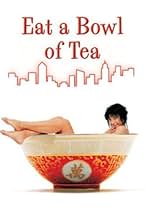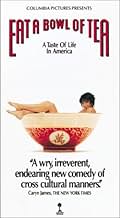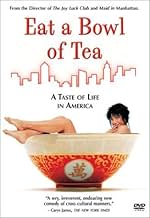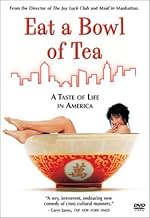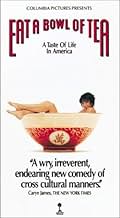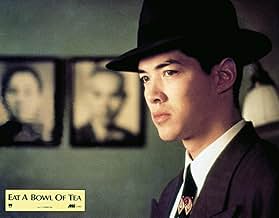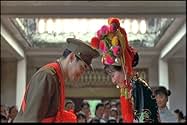A study in culture bridging, including ... a new US-born husband, trying to work within the traditional ways, a new China-born wife, eager to join the "dream" of America, two family-minded f... Read allA study in culture bridging, including ... a new US-born husband, trying to work within the traditional ways, a new China-born wife, eager to join the "dream" of America, two family-minded fathers, lots of gender-related social bifurcations.A study in culture bridging, including ... a new US-born husband, trying to work within the traditional ways, a new China-born wife, eager to join the "dream" of America, two family-minded fathers, lots of gender-related social bifurcations.
Sau-Kei Lee
- Bok Fat
- (as Lee Sau Kee)
Siu-Ming Lau
- Lee Gong
- (as Lau Siu Ming)
Fan Hui
- Ben Loy's Mom
- (as Hui Fun)
Helena Law
- Aunt Gim
- (as Law Lan)
Yuen-Yee Ng
- Third Sister
- (as Ng Yurn Yee)
Ta Lei
- Movie Translator
- (as Lui Tat)
Eric Tsang
- Ah Song
- (as Eric Tsang Chi Wai)
Wai Wong
- Chuck Ting
- (as Wong Wai)
Yu-Yung Teng
- Fat Man
- (as Tang Shun Nin)
Michael Ming-Yang Lee
- Old Lum
- (as Michael Lee)
Wing-Tat Woo
- Sum Woo
- (as Woo Wang Tat)
- Director
- Writers
- All cast & crew
- Production, box office & more at IMDbPro
Featured reviews
American Chinese males (the wives were left behind because that's the way the yanks wanted it), have it tough before, during and just after the silly second world war. This story picks up just after that war when our hero is sent to China to marry a local girl and bring her back to America where it all goes wrong. Charming and well photographed.
A few years after WWII, a young Asian-American man who served his country is sent off to China by his father in the hopes of bringing back a bride. His mother and extended family are still over there, having been separated for decades because of the Chinese Exclusion Act. He's introduced to a young woman, they marry, and then return to America.
The films strengths are in its representation. We see Asian-Americans as real people here, with different personalities, multi-lingual, and having the same problems anyone else has. They have a tightknit community, but are patriotic and assimilated, particularly the younger generation. The stress on the young couple is both cultural (the pressure to produce kids, the lack of privacy) as well as universal (work stress leading to problems in the bedroom, spending too much time in front of the TV, and infidelity). The story went to places I really did not expect it to go, touching on comedy, romance, and drama, and I liked that. I also liked the visibility on the Exclusion Act, which serves as a backdrop to the story, and other little elements, including the reference to Japanese internment when the Korean War starts brewing (fearing it may happen to them), as well as the guy being bruised up after being in police custody.
Undermining all this is the film's acting, which let's just say didn't deserve any awards, as cute as the lead couple are (Cora Miao and Russell Wong). There are a few good moments from one of the old fathers (Victor Wong), but mostly it seemed staged and with poor performances, giving the film a rather lightweight feel. The film tips its hat to both Lost Horizon (1937) and The Lady From Shanghai (1947) which was a lovely touch, but just doesn't conjure up the depth of emotion of the scenes from those films. It kept me engaged from beginning to end though, and director Wayne Wang moved things along nicely. I'm glad I saw it, and think it's worth checking out.
The films strengths are in its representation. We see Asian-Americans as real people here, with different personalities, multi-lingual, and having the same problems anyone else has. They have a tightknit community, but are patriotic and assimilated, particularly the younger generation. The stress on the young couple is both cultural (the pressure to produce kids, the lack of privacy) as well as universal (work stress leading to problems in the bedroom, spending too much time in front of the TV, and infidelity). The story went to places I really did not expect it to go, touching on comedy, romance, and drama, and I liked that. I also liked the visibility on the Exclusion Act, which serves as a backdrop to the story, and other little elements, including the reference to Japanese internment when the Korean War starts brewing (fearing it may happen to them), as well as the guy being bruised up after being in police custody.
Undermining all this is the film's acting, which let's just say didn't deserve any awards, as cute as the lead couple are (Cora Miao and Russell Wong). There are a few good moments from one of the old fathers (Victor Wong), but mostly it seemed staged and with poor performances, giving the film a rather lightweight feel. The film tips its hat to both Lost Horizon (1937) and The Lady From Shanghai (1947) which was a lovely touch, but just doesn't conjure up the depth of emotion of the scenes from those films. It kept me engaged from beginning to end though, and director Wayne Wang moved things along nicely. I'm glad I saw it, and think it's worth checking out.
Focusing on a little-known aspect of Chinese-American history – that Chinese men who had travelled to the States to make their fortune were prevented by federal law from marrying a native girl and from bringing their sweethearts over from China – director Wayne Wang crafts a pleasant story without really exploring the theme's full potential.
Asian heartthrob Russell Wong plays Ben Loy, a Chinese-American former serviceman in post-WW2 New York, who is allowed to marry a girl from the homeland following a relaxation of the laws due to the assistance given to America by China during the conflict. Fixed up by his wily old father (Victor Wong) with the daughter of a friend, Ben travels back to China and instantly (and fortuitously) falls in love with Mei Oi (Cora Miao, Wayne Wang's wife). Bringing her back to America, however, triggers a series of events that threatens both their marriage, and their entire family's standing in the Chinese-American community.
This is one of those films that, in the first act, looks as if it is going to turn out to be something special. But, sadly, things begin to unravel shortly after the young couple return to the States, and what could have been an insightful exploration into a culture and way of life that is alien to most of us becomes little more than a light rom-com. Ben, under pressure from both a new job that is more challenging than he expected and from a tight-knit community keen to welcome the arrival of the first child born to native parents, finds himself unable to perform in the bedroom. Mei Oi's eventual response to this is as unbelievable as it is cruel, and shoehorns a melodramatic plot that really has no place in a film that seemed to be setting itself up as a gently observed character piece. To add insult to injury, the manner in which it is resolved is equally unrealistic; so many questions are left unanswered, and the conclusion is so badly rushed that it devalues much of the good work that has gone before.
There is no doubt that Wang is an extremely talented director; he composes some wonderfully evocative frames and has a keen eye when it comes to the use of colour and shadow, but his control of narrative structure – in this film at least – is poor, leaving a talented cast to flounder in the second act, and seemingly lose interest midway through the third. Of course, Wang can only do what he can with the story handed to him, and writer Judith Rascoe must shoulder her share of the blame: by asking us to care for a couple about whom we are told so little – both as a couple and as individuals – and who seem to have little direction outside of complying with the wishes of their parent's, she leaves herself open to charges of naivety at best and, at worst, literary laziness.
Asian heartthrob Russell Wong plays Ben Loy, a Chinese-American former serviceman in post-WW2 New York, who is allowed to marry a girl from the homeland following a relaxation of the laws due to the assistance given to America by China during the conflict. Fixed up by his wily old father (Victor Wong) with the daughter of a friend, Ben travels back to China and instantly (and fortuitously) falls in love with Mei Oi (Cora Miao, Wayne Wang's wife). Bringing her back to America, however, triggers a series of events that threatens both their marriage, and their entire family's standing in the Chinese-American community.
This is one of those films that, in the first act, looks as if it is going to turn out to be something special. But, sadly, things begin to unravel shortly after the young couple return to the States, and what could have been an insightful exploration into a culture and way of life that is alien to most of us becomes little more than a light rom-com. Ben, under pressure from both a new job that is more challenging than he expected and from a tight-knit community keen to welcome the arrival of the first child born to native parents, finds himself unable to perform in the bedroom. Mei Oi's eventual response to this is as unbelievable as it is cruel, and shoehorns a melodramatic plot that really has no place in a film that seemed to be setting itself up as a gently observed character piece. To add insult to injury, the manner in which it is resolved is equally unrealistic; so many questions are left unanswered, and the conclusion is so badly rushed that it devalues much of the good work that has gone before.
There is no doubt that Wang is an extremely talented director; he composes some wonderfully evocative frames and has a keen eye when it comes to the use of colour and shadow, but his control of narrative structure – in this film at least – is poor, leaving a talented cast to flounder in the second act, and seemingly lose interest midway through the third. Of course, Wang can only do what he can with the story handed to him, and writer Judith Rascoe must shoulder her share of the blame: by asking us to care for a couple about whom we are told so little – both as a couple and as individuals – and who seem to have little direction outside of complying with the wishes of their parent's, she leaves herself open to charges of naivety at best and, at worst, literary laziness.
This is not a great movie, but is still quite good. The story involves Chinese men who suddenly have the chance to marry. Up until then, US immigration quotas separated families in an effort to limit an influx of the Chinese. They did so by allowing MEN into the country but not women! The movie moves at a nice leisurely pace and I had no serious complaints. It's just that there are better stories about the clash between traditional and modern Chinese culture (such as in Eat, Drink, Man, Woman). Still, considering how few movies about Chinese or Chinese-Americans exist, this pretty makes this movie a must-see for the curious viewer.
I remember seeing portions of this film shot at the now defunct and torn down San Francisco Studios. It was an interesting project that was one of many independent films being funded and shot at the time. My one anecdotal memory is seeing much of the crew and the studio employees being ushered out of the infamous Stage 2 (a warehouse like structure with little to no baffling, that served more as a storage area than an actual sound-stage) for the "love making" scenes. Seeing this film over a decade later I can't really understand what all the hub-bub was about ... unless the actors were nude underneath the sheets or something. In any event the bedroom scenes were shot sans an audience.
Oh well.
It's a nice little film that, for some reason, is labeled by Blockbuster Video as a "comedy." Certainly there're a couple of humorous moments, but once again the marketing types pull a bait-and-switch on this customer by labeling a light drama a comedy. This is NOT a comedy. However it does raise a smile here and there, and occasionally a chuckle, and, in spite of the intentional mis-labeling, it is a very good film.
The script moves along well enough. There's a fine story here, but the film's title, for myself, is a missed opportunity. And, unlike in other films, the cultural and generational gaps aren't played up to the hilt. That's a definite plus for this movie. Quality over quantity is given a premium in this movie. Yet at the same time the "message" and title of the film is almost too subtle to grasp, and is only made openly manifest in the final scenes. Even then you have to be somewhat on your toes to catch it.
It's a likable film. The lighting is nicely done, and was the foremost technical aspect that I noticed in this film. The cinematography is intimate and very straightforward. The acting is very fine; no over the top performances, nor understated moments; all characters are given appropriate exposure, and state their messages with emotional clarity.
The film is somewhat slow, but not overly, as is Wayne Wang's style. Overall a well stated film regarding Chinese-American society (specifically a newly wed couple, circa post WW2). It's by no means a gut-busting comedy, though there are comic moments in it. If you're expecting lots of laughs, then don't see this film. If you're expecting some mildly humorous situations told in a dramatic vein, then this film will probably entertain :)
Enjoy!
Oh well.
It's a nice little film that, for some reason, is labeled by Blockbuster Video as a "comedy." Certainly there're a couple of humorous moments, but once again the marketing types pull a bait-and-switch on this customer by labeling a light drama a comedy. This is NOT a comedy. However it does raise a smile here and there, and occasionally a chuckle, and, in spite of the intentional mis-labeling, it is a very good film.
The script moves along well enough. There's a fine story here, but the film's title, for myself, is a missed opportunity. And, unlike in other films, the cultural and generational gaps aren't played up to the hilt. That's a definite plus for this movie. Quality over quantity is given a premium in this movie. Yet at the same time the "message" and title of the film is almost too subtle to grasp, and is only made openly manifest in the final scenes. Even then you have to be somewhat on your toes to catch it.
It's a likable film. The lighting is nicely done, and was the foremost technical aspect that I noticed in this film. The cinematography is intimate and very straightforward. The acting is very fine; no over the top performances, nor understated moments; all characters are given appropriate exposure, and state their messages with emotional clarity.
The film is somewhat slow, but not overly, as is Wayne Wang's style. Overall a well stated film regarding Chinese-American society (specifically a newly wed couple, circa post WW2). It's by no means a gut-busting comedy, though there are comic moments in it. If you're expecting lots of laughs, then don't see this film. If you're expecting some mildly humorous situations told in a dramatic vein, then this film will probably entertain :)
Enjoy!
Did you know
- TriviaThe movie's ''Eat a Bowl of Tea'' title is a literal English translation to a Cantonese Chinese phrase that means "take your medicine" or "swallow your medicine".
- ConnectionsFeatured in The Slanted Screen (2006)
- How long is Eat a Bowl of Tea?Powered by Alexa
Details
- Release date
- Country of origin
- Languages
- Also known as
- Eine Tasse Tee für die Liebe
- Filming locations
- Production company
- See more company credits at IMDbPro
Box office
- Gross US & Canada
- $231,423
Contribute to this page
Suggest an edit or add missing content


